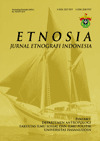Abstract
This paper focuses on studying local women groups' resistance movement toward the policies regarding a permit for mining activities in their villages. Although locals have vehemently opposed this business, the official licenses to continue the activities are remain being issued by state authority and supported by the local government. This could be seen as a red flag from the policy that has been abandoned by local communities' interests. For the past decade, then being involved in social movements against undemocratic policies has sign significantly creased. There is no benefit for them from these policies, and local women also could see that their interests and knowledge have been ignored. The method used in this study is feminist ethnography, focusing on two villages as a location of mining activities. The first is Penago Baru in Seluma, Bengkulu, which has been exploited for their iron sand, then Praikaroku Jangga in Central Sumba, East Nusa Tenggara, as the location for gold mining. The study uses field-talks, in-depth interviews, live-in, thematic group discussions, and field-notes. The participants lived in a social movement or acted as indigenous leaders, NGO activists, and demics. The study shows the distinctive character of these local women communities, in which they tend to have a subaltern identity. As a subaltern community, they have never been considered to exist, as their interests are not included in the policy agenda-setting. Their resistance is actually a reflection of the state's ignorance of the locals' rights. The study also notes that local women communities in both locations are actually reliable agents of local environment knowledge, with their intimate experiences with surrounding nature. Their courage to resist these policies is more of an effort to protect the natural resources and the people, as well as the ecosystem.
References
Apriando, T. (2015). Perempuan Rembang merawat mata air Kendeng: Kajian dampak tambang pada SRHR (Sexual & Reproductive Health & Rights). Ekofeminism III: tambang, perubahan iklim & memori Rahim. Jalasutra.
Asriani, D. D. (2015). Perempuan Mollo merawat tubuh dan alam: Aleta Baun, Paha Nifu, dan pegunungan Mutis. In D. Candraningrum & A.I.R. Hunga (Eds.). In Ekofeminism III: tambang, perubahan iklim & memori Rahim (pp. 125–140). Jalasutra.
Badawi, A. (2015). Gap SRHR (Sexual & Reproductive Health & Rights) dalam kebijakan perubahan iklim: studi kasus kabupaten Jepara & Banyumas. In D. Candraningrum & A.I.R. Hunga (Eds.). Journal of Environment and Earth Science, 3(5). www.iiste.org
Choudhury, R. & C.M. (2018). Scope and Challenges of Sustainable Drinking Water Management in Assam. In book: Urban Ecology, Water Quality and Climate Change. DOI: 10.1007/978-3-319-74494-0_30
Elias, F. (2015). Women’s roles in integrated water resource management: a case study of the Mutale water user association. https://www.researchgate.net/publication/281026879
Handayani, W. & A. I. K. (2014). Narasi air dan perempuan dalam teknologi daur ulang limbah batik di Masaran Sragen. In D. Candraningrum (Ed.). Ekofeminism II: Narasi iman, mitos, air dan tanah (pp. 251–268). Jalasutra.
Hendrastiti, T. K. (2014). Perempuan Lokal vs Tambang Pasir Besi Global. Yayasan Pustaka Obor Indonesia.
Hendrastiti, T. K. (2018). Ragam identitas perempuan ragam identitas perempuan bukan bayang-bayang: menguatkan konstruksi nasionalisme. Yayasan Pustaka Obor Indonesia.
Hiariej, E. & K. S. (2017). Politics of Citizenship. Yayasan Pustaka Obor Indonesia in cooperation with PolGov Fisipol UMG and University of Oslo.
Hunga, A. I. R. (2014). Ancaman kerusakan ekologis produksi batik rumahan: narasi perlindungan ruang domestik. In D. Candraningrum (Ed.). Ekofeminism II: Narasi iman, mitos, air dan tanah (pp. 187–212). Jalasutra.
Hunter, P.R, A.M. Macdonald, R. C. C. (2010). Water Supply and Health. PLoS Med. Water Supply and Health. PLoS Med, 7(10). https://doi.org/https://doi:10.1371/journal.pmed.1000361
Jenkins, K. (2017). Women anti-mining activists’ narratives of everyday resistance in the Andes: staying put and carrying on in Peru and Ecuador. Gender, Place and Culture, 24(10), 1441–1459. https://doi.org/https://doi.org/10.1080/0966369X.2017.1387102
Jerat Papua. (2014). Stop energi kotor batubara, hentikan kriminalisasi pejuang lingkungan hidup, kedaulatan pangan dan energi. Siaran Pers, Uncategorized. Retrieved from http://jeratpapua.org
Knuttila, Murray, Kubik, W. (n.d.). State Theories: Classical, Global and Feminist Perspectives. Amazon.com. Retrieved August 27, 2020, from https://www.amazon.com/State-Theories-Classical-Feminist-Perspectives/dp/1856490270
Maimunah, S. (2017). (2017). Kendeng, Perempuan & Pembangunan Yang Memiskinkan. Berjuang menyelamatkan hutan: sebuah kata hati. Yayasan Pustaka Obor Indonesia. https://indoprogress.com/2017/05/kendeng-perempuan-pembangunan-yang-memiskinkan/
Michael, B. . (1998). The role of women in water resources management: the Tanzania case. International Journal of Water Resources Development, 14(4), 499–504. https://agris.fao.org/agris-search/search.do?recordID=GB1997057744
Nge, S.T.M & Purnomo, A. W. (2014). Pengetahuan perempuan atas tanaman obat: krisis kesehatan ddan ekologi. In Ekofeminism II: Narasi iman, mitos, air dan tanah (pp. 169–186). Jalasutra.
Nugroho, A. C. (2015). Bertani di atas pasir pesisir pantai selatan Yogyakarta: studi kasus perempuan melawan tambang pasir besi. In Ekofeminism III: tambang, perubahan iklim & memori Rahim (pp. 103–124). Jalasutra.
Parker, H., Mason, N., Oates, N., Calow, R., Chadza, W., Ludi, E. (2016). Gender, agriculture, and water insecurity. https://www.odi.org
Priminingtyas, D. N. (2007). ANALISIS SOSIAL EKONOMI PERANAN PEREMPUAN PEDESAAN DI DALAM KELUARGA DAN MASYARAKAT. In BUANA SAINS (Vol. 7, Issue 2). https://doi.org/10.33366/BS.V7I2.198
Taylor, A., & Bonner, M. D. (2017). Policing economic growth: Mining, protest, and state discourse in Peru and Argentina. Latin American Research Review, 52(1), 3–17. https://doi.org/10.25222/larr.63
Taylor, L. (2011). Environmentalism and Social Protest: The Contemporary Anti-mining Mobilization in the Province of San Marcos and the Condebamba Valley, Peru. Journal of Agrarian Change, 11(3), 420–439. https://doi.org/10.1111/j.1471-0366.2011.00313.x
Thai, N. Van, & Guevara, J. R. (2019). Women and Water Management: A Policy Assessment—A Case Study in An Giang Province, Mekong Delta, Vietnam. Asia-Pacific Journal of Rural Development, 29(1), 77–97. https://doi.org/10.1177/1018529119860949
Triscritti, F. (2013). Mining, development and corporate-community conflicts in Peru. Community Development Journal, 48(3), 437–450. https://doi.org/10.1093/cdj/bst024
Watts, S. (2004). Women, water management, and health. Emerging Infectious Diseases, 10(11), 2025–2026. https://doi.org/10.3201/eid1011.040237
Yuliati, Y. (2014). Pengetahuan Perempuan Tengger atas Tanah, Air, dan Hutan. In Ekofeminisme II: Narasi Iman, Mitos, Air, & Tanah. (p. -). Jalasutra.

This work is licensed under a Creative Commons Attribution-NonCommercial 4.0 International License.
Copyright (c) 2020 ETNOSIA : Jurnal Etnografi Indonesia





